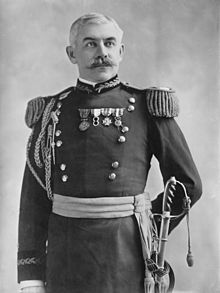Thomas H. Barry
| Thomas Henry Barry | |
|---|---|

Major General Thomas Henry Barry
|
|
| Born |
October 13, 1855 New York City |
| Died |
December 30, 1919 (aged 64) Washington, D.C. |
| Allegiance |
|
| Service/branch |
|
| Years of service | 1877–1919 |
| Rank |
|
| Commands held |
Superintendent of the United States Military Academy Department of the East Philippine Department 86th Infantry Division |
| Awards |
Distinguished Service Medal Silver Star |
Thomas Henry Barry (October 13, 1855 – December 30, 1919) was a United States Army Major General and Superintendent of the United States Military Academy from 1910 to 1912.
Barry was born in a small frame house at 24 Thames Street, near Trinity Place, in Lower Manhattan. He played baseball in Battery Park as a young boy. He received his early education in the public schools and the Free Academy of the City of New York. He graduated from West Point in 1877.
Barry was assigned as a Second Lieutenant to the 7th Cavalry Regiment on June 14, 1877. In 1880 he was transferred to the 1st Infantry. He was appointed Assistant Adjutant General of the army in 1893. He was a Lieutenant Colonel during the Spanish–American War. He was also Adjutant General of the 8th Army Corps during the war. He was appointed Brigadier General of volunteers after a brief period as Adjutant General of the army. As a Brigadier General of volunteers he served in the China Relief Expedition and in the Philippine-American War during 1900–1901. He became a Brigadier General in August 1903. At the start of the Russo-Japanese War of 1904-1905, he was assigned to the Imperial Russian Army as a military observer.
In 1907, he was chosen as commander for the Army of Cuban Occupation and Pacification by President Theodore Roosevelt. He was promoted to Major General on April 29, 1908. He became Superintendent of the United States Military Academy on August 31, 1910. He was succeeded by Clarence Page Townsley as Superintendent of the Academy on August 31, 1912. He was assigned to command the Eastern Division of the US Army for the next two years. In 1914 he was sent to the Philippines and China as commander of all the American troops. He was retired on October 13, 1919.
...
Wikipedia
